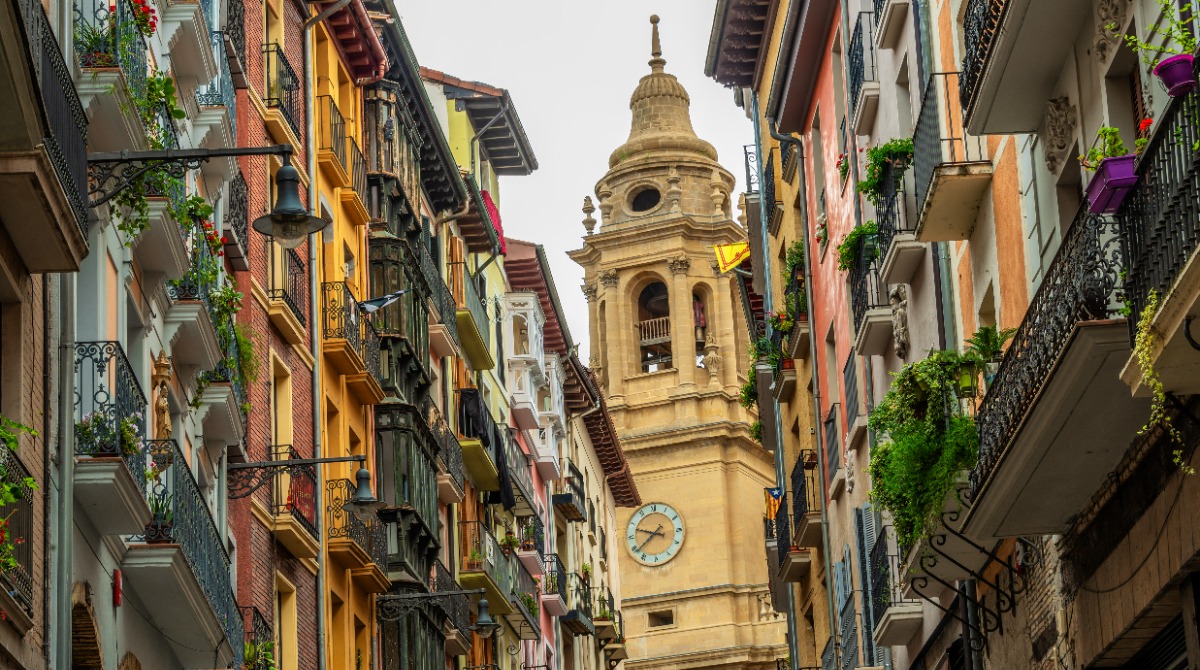Enjoy rich history, vibrant culture, and delicious cuisine in Pamplona

In Pamplona, Spain, there are several activities and attractions to enjoy. Here are some recommendations:
1. Explore the Old Town (Casco Viejo): Wander through its narrow streets, admire the medieval architecture, and visit the Plaza del Castillo, the central square.
2. Visit the Pamplona Cathedral: Marvel at the Gothic and Neoclassical styles of this impressive cathedral and take in its stunning interior.
3. Walk along the City Walls: Experience panoramic views of the city and surrounding countryside while strolling atop the well-preserved city walls.
4. Enjoy the Parks and Green Spaces: Pamplona boasts beautiful parks like the Taconera Gardens, where you can relax and enjoy nature.
5. Learn about the Running of the Bulls: Visit the Plaza de Toros de Pamplona, the bullring, and explore the Hemingway Room, dedicated to the famous author and his love for Pamplona’s festivities.
6. Visit the Museum of Navarra: Discover the history and culture of the region through the museum’s extensive collection of art and artefacts.
7. Indulge in Basque Cuisine: Pamplona offers a variety of traditional Basque dishes, such as pintxos (Basque tapas) and the famous chistorra sausage.
8. Attend a Festival or Event: Besides the Running of the Bulls during the San Fermín festival in July, Pamplona hosts other cultural events, concerts, and exhibitions throughout the year.
9. Explore the Citadel: Discover the 16th-century fortress and its lush green areas, perfect for a leisurely walk or picnic.
10. Take day trips: Pamplona is a great base to explore the nearby picturesque villages, such as Olite with its medieval castle or the wine region of La Rioja.
Enjoy the rich history, vibrant culture, and delicious cuisine that Pamplona has to offer during your visit.
What currency will I need?
The Euro (€) is the official currency of the Eurozone, which consists of 19 of the 27 member states of the European Union (EU). It is also used by several other European countries and territories outside the EU as their official currency, or as a de facto currency. The Euro is one of the most widely used and traded currencies in the world.
The Euro is divided into 100 cents, and it has seven different banknotes denominated in 5, 10, 20, 50, 100, 200, and 500 Euro, as well as eight different coins denominated in 1, 2, 5, 10, 20, 50 cents, and 1 and 2 Euro. The banknotes and coins are standard across all participating countries, with the same design and security features.
The Euro has had a significant impact on trade, investment, and economic integration within the Eurozone, as it has eliminated transaction costs and exchange rate risks associated with multiple currencies. However, it also presents challenges, such as managing the monetary policies of a diverse group of countries with different economic conditions and addressing issues related to fiscal policies, financial stability, and political coordination among member states.
Overall, the Euro has become a symbol of European economic and monetary integration, and it plays a crucial role in the global economy as a major reserve currency and a benchmark for financial markets.
Should I use travel cash or a card?
According to Mintel, 90% of British travellers take some travel cash with them. It’s perfect for tips, taxis, street-side vendors and locations which do not have card machines (or where they are not working). It’s easy to budget with, and share with other members of your party. It’s also not prone to technical faults, does not require internet access, and you won’t be charged to use it.
Having a debit card is also a great idea as backup – just make sure you know what fees the card issuer charges to make payments in the foreign currency (better still, find one that makes no charges at all). Bigger purchases should be made on a travel-friendly UK-issued credit card to get that additional Section 75 protection (see https://www.moneyhelper.org.uk/en/everyday-money/credit-and-purchases/how-youre-protected-when-you-pay-by-card). Make sure when paying by card that you ALWAYS pay in the foreign currency – do not let the card processor do the conversion to GBP as you will always get a worse rate. That applies even if the foreign currency is already loaded onto a prepaid multi-currency card – the card issuer will decide whether to settle from your foreign currency wallet or not.
Where can I buy currency?
You will typically get a better deal buying your travel cash here in the UK before you travel. Look for the highest possible foreign currency exchange rate to indicate the best deal. For example, a rate of EUR €1.1225 is better than EUR €1.0952 when buying Euro (EUR). Airports tend to offer the worst rates – especially if you have not pre-ordered – and you may find a bureau de change on your High Street, in a supermarket or department store, in many travel agents, and at major transport hubs.
You can also buy Hungarian Forint from Travel Money Club for next business day despatch to home via fully insured Royal Mail Special Delivery Guaranteed by 1pm. Unlike the competition, we don’t hide fees and charges in our exchange rates – you just pay a fair and transparent handling fee based on how much you are exchanging. Get an instant quote now at https://yourtmc.link/quote-eur.


